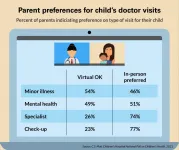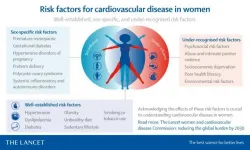Save our oceans to protect our health - scientists call for global action plan
Scientists have proposed the first steps towards a united global plan to save our oceans, for the sake of human health
2021-05-17
(Press-News.org) Scientists have proposed the first steps towards a united global plan to save our oceans, for the sake of human health.
An interdisciplinary European collaboration called the Seas Oceans and Public Health In Europe (SOPHIE) Project, led by the University of Exeter and funded by Horizons 2020, has outlined the initial steps that a wide range of organisations could take to work together to protect the largest connected ecosystem on Earth. In a commentary paper published in the American Journal of Public Health the researchers call for the current UN Ocean Decade to act as a meaningful catalyst for global change, reminding us that ocean health is intricately linked to human health.
The paper highlights 35 first steps for action by different groups and individuals, including individual citizens, healthcare workers, private organisations, researchers and policy-makers.
First author Professor Lora Fleming, of the University of Exeter, said: "The devastating COVID-19 pandemic, climate and other environmental change and the perilous state of our seas have made clear that we share a single planet with a single global ocean. Our moral compass points to addressing the myriad threats and potential opportunities we encounter by protecting and providing for everyone, both rich and poor, while learning to sustain all ecosystems."
The researchers point to our huge reliance on our global ocean as a source of food and economic income internationally, as well as a precious resource that research shows benefits our mental and physical health. However, the consequences of the impact of human activity are severe. Extreme weather events induced by climate and other environmental change result in coastal flooding, exposure to harmful algal blooms, and chemical and microbial pollution. These threats are compounded by sea-level rise, ocean warming, acidification, and deoxygenation associated with global environmental change.
At the same time, the coasts, seas and ocean provide us with food, trade, culture, renewable energy, and many other benefits. In fact, there is now strong evidence that access to healthy coasts can improve and preserve our physical health and mental wellbeing. And a healthy ocean is a major source of potential natural products including medicines and green substitutes for plastics.
The paper suggests a list of possible first steps to a wide range of groups who can influence ocean health, emphasising that holistic collaboration is essential to make an impact. For example:
Large businesses can review their impact on ocean health, share best practice and support community initiatives.
Healthcare professionals could consider "blue prescriptions", integrated with individual and community promotion activities
Tourism operators can share research on the benefits of spending time by the coast on wellbeing, and collect and share their customers' experiences of these benefits.
Individual citizens can take part in ocean-based citizen science or beach cleans and encourage school projects on sustainability.
The paper calls on planners, policy-makers and organisations to understand and share research into the links between ocean and human health, and to integrate this knowledge into policy.
Co-author Professor Sheila JJ Heymans, of the European Marine Board, said: "The UN Ocean Decade is a chance to truly transform the way we interact with the global ocean. Given how critical the link is between the health of people and the health of the ocean and how important the ocean is for humans, achieving the aims of the Ocean Decade should not be left to just the ocean community. By working together with communities, policy makers, business and other stakeholders, we add impetus to finding powerful, effective, new ways to foster a step change in public health."
INFORMATION:
The paper is entitled 'The Ocean Decade-- Opportunities for Oceans and Human Health Programs to Contribute to Public Health', and is published in the American Journal of Public Health.
ELSE PRESS RELEASES FROM THIS DATE:
2021-05-17
In its response to pathogens and vaccines, our immune system relies on dendritic cells. These white blood cells patrol the body's tissues, collect components of pathogens and vaccines and transport them via lymphatic vessels to the nearest lymph node. There, they present the collected material to other immune cells in order to trigger an immune response.
How exactly dendritic cells get from the tissue into lymphatic vessels and from there to the lymph node is the focus of research conducted by Cornelia Halin, Professor of Pharmaceutical Immunology at ETH Zurich. For a long ...
2021-05-17
ANN ARBOR, Mich. -- For children, pandemic norms have meant virtual school, holidays over Zoom and for some, even seeing the doctor from their own homes.
One in five parents in a new national poll say their child had a virtual health visit over the past year for either check-ups, minor illnesses, mental health or a follow up - a marked increase in remote care for children.
And while some parents still have reservations about using telemedicine for their kids, the majority were satisfied with the experience, suggest findings from the C.S. Mott Children's Hospital National Poll on Children's Health at the University of Michigan.
"COVID has had a major impact ...
2021-05-17
Indigenous peoples in Canada have higher rates of death and complications after surgery and lower rates of surgeries than other populations, found new research published in CMAJ (Canadian Medical Association Journal).
"Understanding surgical outcomes and access to surgical services is a vital step toward addressing colonialism and structural racism within health care, so we can identify the gaps and determine what needs to be improved," said Dr. Nadine Caron, a general surgeon in Prince George and co-director of the Centre for Excellence in Indigenous Health ...
2021-05-17
Hamilton, ON (May 17, 2021) - Boys born weighing less than a kilogram are miracles, but they do not age as well as the girls, according to new research from McMaster University.
Researchers following a group of extremely low birth weight (ELBW) babies as well as their normal weight counterparts have found that, at least biologically, the premature or preemie boys age more quickly and are 4.6 years older than boys with normal birth weight born at the same time. The difference was not found between birth weight groups in girls.
In the study published in the journal Pediatrics today, the researchers point out that the rate of aging may be influenced by boys' handling ...
2021-05-17
Whether it's plankton exposed to parasites or people exposed to pathogens, a host's initial immune response plays an integral role in determining whether infection occurs and to what degree it spreads within a population, new University of Colorado Boulder research suggests.
The findings, published May 13 in The American Naturalist, provide valuable insight for understanding and preventing the transmission of disease within and between animal species. From parasitic flatworms transmitted by snails into humans in developing nations, to zoonotic spillover events from mammals and insects to humans--which have caused ...
2021-05-17
Fifty years after presumably becoming extinct as a breeding species in Bulgaria, the Griffon Vulture, one of the largest birds of prey in Europe, is back in the Eastern Balkan Mountains. Since 2009, three local conservation NGOs - Green Balkans - Stara Zagora, the Fund for Wild Flora and Fauna and the Birds of Prey Protection Society, have been working on a long-term restoration programme to bring vultures back to their former breeding range in Bulgaria. The programme is supported by the Vulture Conservation Foundation, the Government of Extremadura, Spain, and EuroNatur. Its results have been described in the open-access, peer-reviewed Biodiversity Data Journal.
Two large-scale projects funded by the EU's LIFE tool, one of them ongoing, facilitate the import of captive-bred or ...
2021-05-17
Sophia Antipolis, 17 May 2021: Women with mildly elevated blood pressure in their early 40s have a two-fold risk of acute coronary syndromes in their 50s compared to their counterparts with normal blood pressure. That's the finding of a study published on World Hypertension Day in the European Journal of Preventive Cardiology, a journal of the European Society of Cardiology (ESC).1
"Even if they feel healthy, women should have their blood pressure measured by their primary care physician and repeated at regular intervals with the frequency dependent on the level," said study author ...
2021-05-17
Regular gamblers were more than six times more likely to gamble online compared to before the COVID-19 pandemic, according to new research.
The study, led by the University of Bristol and published today (17 May) in the Journal of Gambling Studies, showed regular male gamblers were particularly prone to gambling more often online during the public lockdown in the UK, compared to their previously reported gambling habits.
Although overall men and women gambled less frequently during lockdown, partly due to betting shops being closed, some forms of gambling increased. For instance, usage of online gambling, including poker, bingo, and casino games, grew six-fold among regular gamblers. Respondents who gambled occasionally were still found to be more than twice ...
2021-05-17
A unique commission that today issued major new recommendations aimed at fully understanding and reducing the global burden of heart disease in women was led by Roxana Mehran, MD, Professor of Medicine, and Population Health Science and Policy, and Director of Interventional Cardiovascular Research and Clinical Trials at the Icahn School of Medicine at Mount Sinai.
"The Lancet Women and Cardiovascular Disease Commission" developed specific, worldwide recommendations for heart disease prevention and treatment based on an unprecedented global review and analysis. The recommendations ...
2021-05-17
The Lancet women and cardiovascular disease Commission outlines 10 ambitious recommendations to improve health outcomes for millions of women around the world and achieve the global targets set.
In the first-ever global report on cardiovascular disease (CVD) in women, researchers call for urgent action to improve care and prevention, fill knowledge gaps, and increase awareness to tackle the worldwide leading cause of death among women. The all female-led Commission report was published in The Lancet and presented during a plenary session at the American College of Cardiology's 70th Annual Scientific Session (ACC.21). ...
LAST 30 PRESS RELEASES:
[Press-News.org] Save our oceans to protect our health - scientists call for global action plan
Scientists have proposed the first steps towards a united global plan to save our oceans, for the sake of human health




